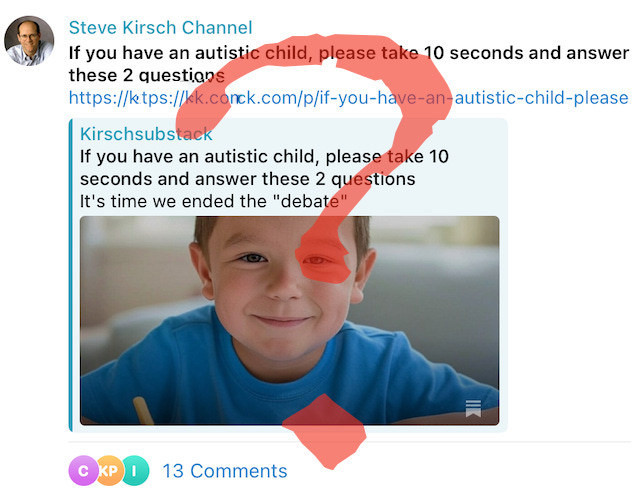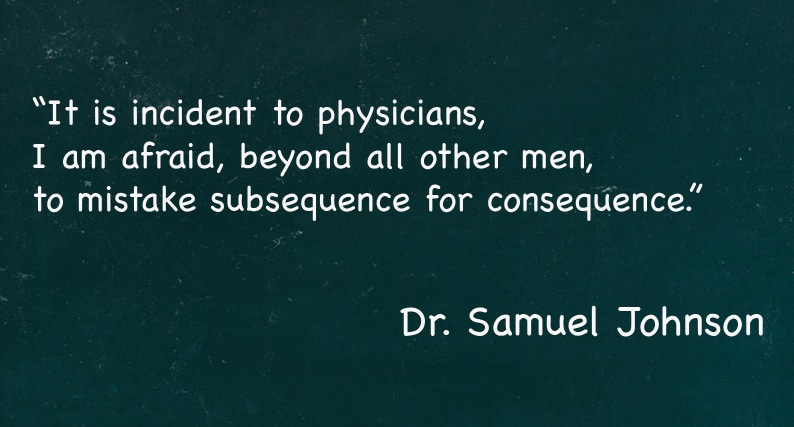Let's Talk about The Autism-Vaccine Timing Connection
Can a survey by an anti-vaccine influencer prove that there is an association between vaccines and autism?
Why does Steve Kirsch think that an unscientific survey of his readers can end the debate on whether vaccines are associated with autism, a debate that anti-vaccine folks are the only ones still having?

Mostly because he seems to believe that his surveys have real scientific merit.
Let's Talk about The Autism-Vaccine Timing Connection
In reality though, his surveys miss out on one big thing — they don’t control for bias.
You see, an anti-vaccine influencer can’t ask his anti-vaccine followers survey questions and expect to get useful answers.

But that’s his thing…
“What's particularly noteworthy is that 52% of parents observed changes in their child within just 2 weeks following vaccination. This temporal relationship cannot be dismissed as mere coincidence, despite the institutional narrative that has worked tirelessly to sever any connection between vaccines and neurological changes.”
If you have an autistic child, please take 10 seconds and answer these 2 questions
Still, why would a survey of his readers suggest that a significant behavior or skill change was first noticed within a few weeks of their children getting vaccinated?
In addition to the very simple fact that his survey is unscientific, there is the issue of:
recall bias — “A type of bias that occurs when participants in a research study or clinical trial do not accurately remember a past event or experience or leave out details when reporting about them… Recall bias can lead to wrong conclusions about what the study showed. It can occur in studies that ask participants to provide information from memory, such as in case-control studies or retrospective cohort studies.”
temporal binding — “a phenomenon that reinforces that assumption of cause and effect once we have linked two events causally in our minds. The effect biases our memory so that we remember the apparent cause and effect occurring closer together in time. In experiments we tend to remember the cause as happening later and the effect happening earlier.”
confirmation bias — the observation that “people tend to select and interpret information in a way that confirms their existing positions”
post hoc fallacy — even though vaccines are not associated with autism, because they are given around the same time that children are screened and often develop the first signs of autism, more than a few children are going to coincidentally develop those signs and symptoms right after they get a vaccine.
And studies have proven that these factors have affected how parents think about vaccines and autism!
The relationship has not been casually dismissed.
It has been disproved!
“Parents of autistic children with regressive symptoms who were diagnosed after the publicity alleging a link with measles, mumps, and rubella (MMR) vaccine tended to recall the onset as shortly after MMR more often than parents of similar children who were diagnosed prior to the publicity. This is consistent with the recall bias expected under such circumstances.”
Recall bias, MMR, and autism
For example, it wasn’t until after Andy Wakefield came on the scene that more and more parents started to recall that their children regressed very shortly after they got their MMR vaccine!
The Autism-Vaccine Debate That Anti-Vaccine Influencers Won’t Let Die
And what about the autism-vaccine debate that Steve Kirsch proposes we need to end?
“In other words, we know that the anecdotes are wrong because scientists took parents’ concerns seriously, carefully tested vaccines, and repeatedly found that there is no relationship between vaccines and autism. Further, just to be clear, scientists didn’t just do one small study then call it quits. Rather, they have looked it this from multiple angles such as testing different vaccines, examining the effects of age at vaccination, studying children that are at a high risk of autism, testing different doses of vaccines, etc., and some of those tests have been enormous (the largest used over 1.2 million children!).”
Why are there so many reports of autism following vaccination? A mathematical assessment
A so-called debate that anti-vaccine influencers are desperate to keep going, as they need parents to think that their kids will somehow become damaged if they get them vaccinated and protected.
“The study strongly supports that MMR vaccination does not increase the risk for autism, does not trigger autism in susceptible children, and is not associated with clustering of autism cases after vaccination. It adds to previous studies through significant additional statistical power and by addressing hypotheses of susceptible subgroups and clustering of cases.”
Measles, Mumps, Rubella Vaccination and Autism: A Nationwide Cohort Study
A debate that is over for anyone who has done their research.
“If you’re thinking about writing a thriller featuring an evil scientist, might I suggest selecting Andrew Wakefield as the central antagonist. Few individuals in the history of biomedicine have done as much harm to public health.”
Vaccines Don’t Cause Autism. But the Lie That They Do Is Still Going Strong
A debate that started with a fraudulent study by Andy Wakefield that was eventually retracted and never replicated, but not before it was sensationalized by the media and anti-vaccine celebrities!
But if you are still in this debate, ask yourself:
Even when parents say that their child regressed shortly after getting vaccinated, when experts look at home videos of those kids, why do they often see signs and symptoms well before that age?
Why didn’t rates of autism increase when they added a second dose of MMR before age two years in Canada?
Why don’t rates of autism increase correlate to changes in MMR coverage?
Why have studies found “no temporal association between onset of autism within 1 or 2 years after vaccination with MMR” and that “developmental regression was not clustered in the months after vaccination?”
Why did a meta-analysis suggest that vaccinations are not associated with the development of autism or autism spectrum disorder and that the components of the vaccines (thimerosal or mercury) or multiple vaccines (MMR) are not associated with the development of autism or autism spectrum disorder?
If the MMR vaccine causes autism, then why didn’t the rates of autism drop in Japan when they switched to the MR vaccine in 1993?
Review all the studies that have already been done before having an anti-vaccine influencer try to do another study.
Understanding the Correlation Between Vaccines and Autism
And if you are still shaking your head about the idea that it could simply be a coincidence or chance that a child just had a vaccine and was soon diagnosed with autism, just do the math!
“Parents are looking for answers, understandably. And so the issue was very ripe for it to be associated with vaccines—not by cause and effect, but by timing and temporality.”
Vaccines Don't Cause Autism. Why Do Some People Think They Do?
Consider that nearly 4 million babies are born in the United States each year and that at least 90% of them are fully vaccinated.
Also, in addition to the vaccines they get as an infant, these children will get vaccinated when they are 12 months, 15 months, 18 months, and 24 months old.
Using the latest statistics that 2.8% of children are diagnosed with autism and that up to about 30% are diagnosed before age three, let’s consider the chance that a parent will notice signs or symptoms of autism that correlates with their getting a vaccine.
4 million children
4 million children * .90 vaccinated = 3.6 million children
3.6 million vaccinated children * 2.8% = 100,800 autistic children
100,800 autistic children * 30% = 30,240 children diagnosed before age three years of age
30,240 children diagnosed before age three years of age / 730 days = 41 vaccinated children diagnosed with autism every day between age 12 months and 3 years
So just by chance, you would expect about 41 children to be both vaccinated and be diagnosed with autism on each and every day between the ages of 12 months and 3 years.
Now let’s add in the days that those kids actually happen to get those vaccines and see what happens…
Since there are at least four separate times that toddlers get vaccines, then simply by chance, there will be:
at least four days that parents might notice their children developing symptoms of autism on the same day they got a vaccine, which comes to 41 children * 4 days = 84 children who developed symptoms of autism coincidently on the same day they got a vaccine
at least four weeks that parents might notice their children developing symptoms of autism during the same week they got a vaccine, which comes to 41 children * 4 weeks * 7 days = 588 children who developed symptoms of autism coincidently in the same week they got a vaccine
at least four months that parents might notice their children developing symptoms of autism during the same month they got a vaccine, which comes to 41 children * 4 months * 30 days = 4,920 children who developed symptoms of autism coincidently in the same month they got a vaccine
To be very, very clear.
These aren’t kids that developed autism because they were vaccinated!
These are kids who were vaccinated and, coincidentally, developed symptoms of autism around the same time that they had a vaccine.
“Vaccine-safety concerns gain prominence whenever the incidence of vaccine-preventable diseases falls to negligible levels and when the number of vaccine adverse events, whether true reactions or those coincidental to the vaccination but falsely attributed to it, rises as a consequence of high vaccine coverage. False attribution usually occurs because many developmental abnormalities first manifest in the early years of life, which is also when several vaccines—which can cause crying, fever, and, occasionally, febrile seizures—are given.”
Vaccine adverse events: causal or coincidental?
And until cases of vaccine preventable diseases had begun to rise, anti-vaccine influencers had an easy time scaring parents into thinking that these temporally related events actually mean that vaccines are associated with autism.

Stop listening to them!
Vaccines are not associated with autism.
References
Hviid A, Hansen JV, Frisch M, Melbye M. Measles, Mumps, Rubella Vaccination and Autism: A Nationwide Cohort Study. Ann Intern Med. 2019 Apr 16;170(8):513-520. doi: 10.7326/M18-2101. Epub 2019 Mar 5. PMID: 30831578.
Vaccines Don’t Cause Autism. But the Lie That They Do Is Still Going Strong
Fombonne E, Zakarian R, Bennett A, Meng L, McLean-Heywood D. Pervasive developmental disorders in Montreal, Quebec, Canada: prevalence and links with immunizations. Pediatrics. 2006 Jul;118(1):e139-50. doi: 10.1542/peds.2005-2993. PMID: 16818529.
Dales L, Hammer SJ, Smith NJ. Time trends in autism and in MMR immunization coverage in California. JAMA. 2001 Mar 7;285(9):1183-5. doi: 10.1001/jama.285.9.1183. PMID: 11231748.
Kaye JA, del Mar Melero-Montes M, Jick H. Mumps, measles, and rubella vaccine and the incidence of autism recorded by general practitioners: a time trend analysis. BMJ. 2001 Feb 24;322(7284):460-3. doi: 10.1136/bmj.322.7284.460. PMID: 11222420; PMCID: PMC26561.
Taylor B, Miller E, Farrington CP, Petropoulos MC, Favot-Mayaud I, Li J, Waight PA. Autism and measles, mumps, and rubella vaccine: no epidemiological evidence for a causal association. Lancet. 1999 Jun 12;353(9169):2026-9. doi: 10.1016/s0140-6736(99)01239-8. PMID: 10376617.
Taylor LE, Swerdfeger AL, Eslick GD. Vaccines are not associated with autism: an evidence-based meta-analysis of case-control and cohort studies. Vaccine. 2014 Jun 17;32(29):3623-9. doi: 10.1016/j.vaccine.2014.04.085. Epub 2014 May 9. PMID: 24814559.
Uchiyama T, Kurosawa M, Inaba Y. MMR-vaccine and regression in autism spectrum disorders: negative results presented from Japan. J Autism Dev Disord. 2007 Feb;37(2):210-7. doi: 10.1007/s10803-006-0157-3. PMID: 16865547.
Chen RT, DeStefano F. Vaccine adverse events: causal or coincidental? Lancet. 1998 Feb 28;351(9103):611-2. doi: 10.1016/S0140-6736(05)78423-3. PMID: 9500313.




Please try hypothesising neurodivergence as an hpa-axis dysfunction (or better put a highly reactive hpa axis) brought on by genetic plasticity and then consider the relevance of illness, environment and even vaccines.
Look into hpa-axis dysfunction and how this related to autism. You might find some valuable insights.